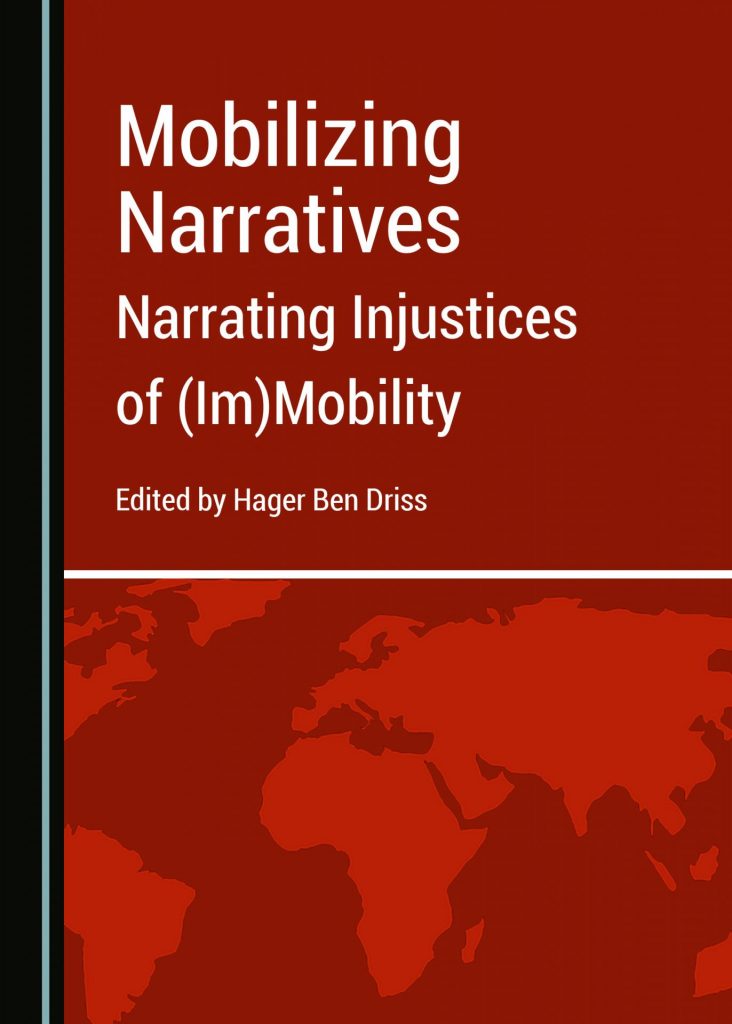New writing on migration and mobilities – an MMB special series
By Hager Ben Driss.
Stephen Greenblatt defines ‘mobilizers’ as ‘agents, go-betweens, translators, or intermediaries’ (Cultural Mobility: A Manifesto p. 251) and contends that their function as contact facilitators should be included in mobility studies. This concept of mobilization serves as an ethical lever of my new edited volume Mobilizing Narratives: Narrating Injustices of (Im)Mobility (Cambridge Scholars Publishing, 2021). But how can editing a book be considered an act of mobilization? The answer is contingent on one’s conception of editing. Editing, in my opinion, is based on mobility, a dynamic intellectual movement between the editor and authors. The editor’s role is to synchronize writing motions and rally texts to serve a purpose. From this perspective, I am more of a mobilizer than a mere assembler of papers, because I was able to raise the attention of several scholars and rally interest to current mobility injustices.

This book explores the dynamic interplay between (im)mobility, injustice and narration. Its chief objective is to foreground the continua and connections at the heart of mobility and immobility as well as justice and injustice. While my conception of the whole book is informed by Mimi Sheller’s seminal Mobility Justice (2018), I opted to utilize ‘(Im)Mobility’ and ‘Injustice’ as key words in the title. Using parentheses to separate immobility from mobility is not only a typographical device to foreground immobility, but also a mode to highlight the visual and phonetic inseparability of the two terms. As for advancing the term ‘injustice’, I am mainly indebted to Judith N. Shklar’s compelling text The Faces of Injustice (2005), as well as to Miranda Fricker’s Epistemic Injustice (2007). In the collection’s introduction, I provide a working definition of (im)mobility injustice inspired by Fricker’s definition of epistemic injustice:
‘I call (im)mobility injustice the wrong done to someone in their capacity as an (im)mobile agent, and thus in a capacity essential to human life. Such an injustice occurs when someone’s movement or stasis are damaged. Therefore, we might say that this injustice is caused by prejudice in the economy of (im)mobility. This (im)mobility deficit damages the subject’s humanity to the extent that they are degraded qua (im)mobile subjects, and they are degraded qua humans.‘
Mobilizing Narratives: Narrating Injustices of (Im)Mobility seeks to fill a gap in mobility research. The volume sustains an emphasis on pressing the boundaries of mobility studies to the realm of literary studies, as well as attempting to create spaces for debate and exchange between literature, sociology and other related fields. It maintains the aim to reflect on the reciprocal exchange between (im)mobilities and narrative practices. Literary production has the capacity to gauge the power of discourses undergirding (im)mobility injustices. The book adds a new intervention in the field of mobility studies. Its focus on (im)mobility and injustice is reinforced by foregrounding the capacity of literature to marshal emotions and values. It is also attentive to the power of narratives to mobilize a sustained critique of uneven (im)mobility.
The volume takes up the task of politicizing motion and inertness by answering one of the pressing questions raised in relation to mobility and immobility injustice: Who enjoys a full claim to (im)mobility and who is denied this right? The eight chapters that constitute this book address coerced movement and stasis in conjunction with travel, immigration, identity, colonization, gender and environment. They engage in a text-based approach within a deliberate move to synchronize mobility studies and literary studies. Through diverse lenses of analysis, they demonstrate that (im)mobility is not mere motion or stasis; it is an apparatus of power. Like any other product, (im)mobility justice is differentially and unequally distributed.
While the rationale behind this collection is to bring attention to the injustices associated with various forms of (im)mobility, it also maintains the goal of enhancing a collective consciousness, accountability and redress, hence mobilization. The book’s ultimate objective is to advance (a)kinetic ethics, or the ethics of (im)mobility. Shklar’s philosophy of injustice provides us with a comprehensive understanding of the ethical issue at the heart of uneven (im)mobility: ‘To have no idea of what it means to be treated unjustly is to have no moral knowledge, no moral life’ (p. 15). Research into (im)mobility is fundamentally a venture to ethicize as well as politicize movement and stasis.

